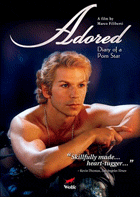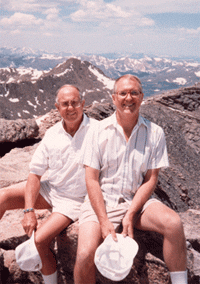 In this
issue, Jerry Flack turns his attention to the cinema, in
particular,
In this
issue, Jerry Flack turns his attention to the cinema, in
particular, Adored
As usual, Jerry has given a
great deal of thought to the emphasis in his review, which usually goes
well beyond the confines of the book or film at hand. If you enjoy his
reviews, write to him to let him know. Contact
 FILM REVIEW from
Jerry Flack: FILM REVIEW from
Jerry Flack: ADORED: DIARY OF A MALE PORN STAR (formerly titled A LITTLE MORE THAN A YEAR AGO). Wolfe DVD, 2004. Italian with English subtitles. Adored, perhaps. Promising, absolutely. The Italian film "Adored: The Diary of a Male Porn Star" is a beautiful movie and it is not difficult to understand why it currently is Wolfe’s No. 1 gay DVD bestseller. "Adored: The Diary of a Male Porn Star" does briefly reveal its hero, Italian porn star extraordinaire Riki Kandinsky (Marco Filiberti) writing in his diary in the pivotal year of 1999, and later shows his older French brother Federico Soldani (Urbano Barberini) poignantly reading Riki’s journal at other junctures in the film. There are even voice-overs of the contents of Riki’s diary being read for a documentary feature made about his life. But, the subtitle is quite misleading if pornographic titillation is what viewers seek. "Adored" is anything but a porn film. Viewers who seek plenty of raw on-screen sex or a behind the scenes story of the pornography industry will be sorely disappointed. Yes, there is nudity and it is clear from his own words, captured in a pseudo-celebrity interview, that gay sex is high on Riki’s list of favorite activities. Riki Kandinsky, born into an aristocratic French family (as Riccardo Soldani), becomes the most magnetic porn star in Italian cinema and print history and is the star character of "Adored," but truthfully, pornography is quite peripheral to the central story of family relationships. There is not another contemporary GLBT movie that explores the delicate relationship between gay and straight siblings so well. "Adored" is a far greater contribution to gay film history as a story of familial love and friendship between two brothers than it is as a porn film. The concept of brotherhood allows the script of this very promising film to expand to an even broader theme of family dysfunctions in which parents cruelly use their children to get back at their spouses. It is not insignificant that the viewers learn that the titanic gap in years and knowledge as well as both love and disapproval between the two brothers essentially begins and ends with the deaths of their mother and father. Riki, unloved by his father but adored by his mother, leaves the family home, a rapidly deteriorating French castle, immediately following the death of his mother. He moves to Rome where he drastically changes his appearance and even invents a new name and persona for himself, Riki Kandinsky, porn model and actor. Thus, he is a totally different person when he next sees his brother more than a decade later at the funeral of their father. Federico, the staid and proper aristocratic elder Soldani brother is shocked at the physical appearance of his blond and expensively dressed younger brother. He has yet to learn that his brother in the passing decade has become a pornographic Adonis in Italian magazines and cinema. Riki is so handsome and so comfortable with sexual adoration that even Italian heterosexuals watch his films and buy the 80 + magazines featuring him as the cover model in the preceding decade. The death of his father and the shocking news that the senior Soldani had secretly squandered all the family money leaving him now bankrupt coupled with the sudden appearance of the obviously very wealthy younger brother Riccardo, prompts Federico Soldani to travel to Rome on the pretext of meeting with his father’s lawyers, but with the true mission of finding out who his brother really is as well as to discover the source of his wealth. In the intervening years Federico has married, fathered a son, and then unwisely abandoned both. The rich texture of "Adored," an amazing film, is not to be found in pornography but in the relationship of newfound love and respect between brothers who initially appear not only to be opposites but to actively dislike one another. They are incredibly different. Federico has kept the cherished family name and has established a respectable and conservative standing in the community while Riki has dramatically altered not only his name and the color of his hair, but the entire purpose and meaning of his life. The soul of this lovely film is really how two brothers, finally left alone and without their parents’ interference, come to love and appreciate one another. That wonderfully evocative message is director Filiberti’s best of many shining accomplishments. A host of emotions ranging from farce and humor to tragedy accompany the bonding of the two brothers. There is an ethereal quality to Riki. He even resembles many people’s image of an angel. He publicly states in a TV interview that he is gay, but that he does not even believe in long-term gay relationships. He believes all relationships, over time, are doomed. However, an entirely new sub-plot emerges when Riki witnesses the death of a woman, a single lesbian mother, in an automobile accident. Much like an angel, Riki bonds with her six-year-old abandoned son, Plapla (Pietro). Ultimately, even the jaded and abused Riki finds a relationship he cannot live without. Devoid of any hint of pedophile motivation, Riki seeks to adopt the boy as his son only to be thwarted by the selfish grandparents who had abandoned their lesbian daughter and had never seen their grandson until the occurrence of the fatal accident. Although, this subplot somewhat detracts from the growing understanding of the brotherhood theme of the movie, give Marco Filiberti credit for tackling a very difficult subject: adoption by homosexual adults. Many of the most liberal nations in the world that support gay marriages today often shy away from allowing homosexuals to adopt children (e.g., Belgium), even the children of their married partners. Filiberti earns credit for bringing to the forefront a subject that needs to be aired, discussed, and decidedly explored to even greater depths in all media. One of the glories of "Adored" for Italian-speaking viewers is the punctuated evolution of time the director achieves, even factoring in the types of film he utilizes. In addition to the splendid contemporary film footage, split screen home movies fill in the gaps of the childhood lives of the brothers, including the father’s shameless demonstration of love for Federico and dislike for Riccardo, and of the mother’s indulgent and abundant love for the same younger son. But, the film commences with pseudo-documentary footage set in the year 2014 of various people recalling Riki’s glamorous life in much the same manner Oscar-winning director Warren Beatty used documentary-style footage of real-life contemporaries of John Reed in his great film, "Reds" (Paramount, 1981). Key moments in the film range from home video camera images of children, perhaps filmed in the 1970s, the pivotal year of 1999-2000, and the futuristic documentary film set in 2014, and incidentally produced by the orphaned child, Plapla (now Pietro), whom Riki attempted to adopt years earlier. Director Filiberti moves swiftly from one time period to another, even perhaps too rapidly for audiences who must also read every spoken word via English subtitles. Indeed, as fine a film as "Adored" is, it may require more than one viewing for audiences to fully comprehend the evolution of the plot events and character changes. But, that is not all bad for "Adored" is a gorgeous film that deserves repeated viewings. The true marvel of "Adored" are the multiple responsibilities Marco Filiberti achieves as writer-star-director with considerable assurance and success. American audiences have grown somewhat accustomed to one-person movie productions by such notables as Barbra Steisand, Clint Eastwood, Woody Allen, Warren Beatty, and Robert Redford. Streisand and Eastwood even compose the musical scores for their solo extravaganzas. But few of these world famous celebrities almost single-handedly produced masterpieces of the quality of Filiberti’s debut film, "Adored." Filiberti shows enormous promise in every aspect of his many roles. As a star, he is an extraordinarily handsome blond Adonis. This man is eye candy for certain, and not of the Hershey’s variety. He is Godiva Chocolate all the way! His distinctive writing embraces emotions across a gamut of emotions that range from humor, anger, and love to poignancy and despair. The production values are extremely high. Although most of the motion picture is filmed indoors, especially in Rome, the French countryside scenery is worthy of the cinematography found in Merchant Ivory films. As a director, Marco Filiberti achieves stunning performances from his actors. He is neither jealous of screen time or other performers' talents. Indeed, he virtually indulges Urbano Barberini into taking the lead role and the actor returns the favor with an Oscar-caliber performance that all but steals the movie from its hero. Filiberti’s generosity extends to even the most eccentric roles. Riki’s relativism is seen in the loving attention and treatment he affords even the quirkiest characters. Even written across the screen in Italian (with English subtitles) viewers quickly ascertain that Marco Filiberti is a masterful filmmaker hopefully well on his way to producing masterpieces not unlike his fellow countryman of another era, Federico Fellini. Marco Filiberti is not only a charismatic star, he is also a writer of depth and a director of consequence. His debut feature film promises much. For readers and viewers who want to know more about the making of this fine Italian film, an exceptionally complete Website exists at: http://www.adoredthemovie.com —Jerry Flack, Denver,
Colorado
|
 Jerry Flack, a few years and pounds ago, enjoys living in the Rocky Mountains. He is shown here with his partner of fifteen years, George Summers, at the very top of Mt. Evans, one of Colorado's 54 mountain peaks that exceed 14,000+ feet. Jeopardy question: What is the highest paved road in the U.S.A.? The correct answer is the Mt. Evans Highway that winds its way up to 14, 264 feet. Amazingly, all of Mt. Evans belongs to the people of Denver. It is a Denver city park! |